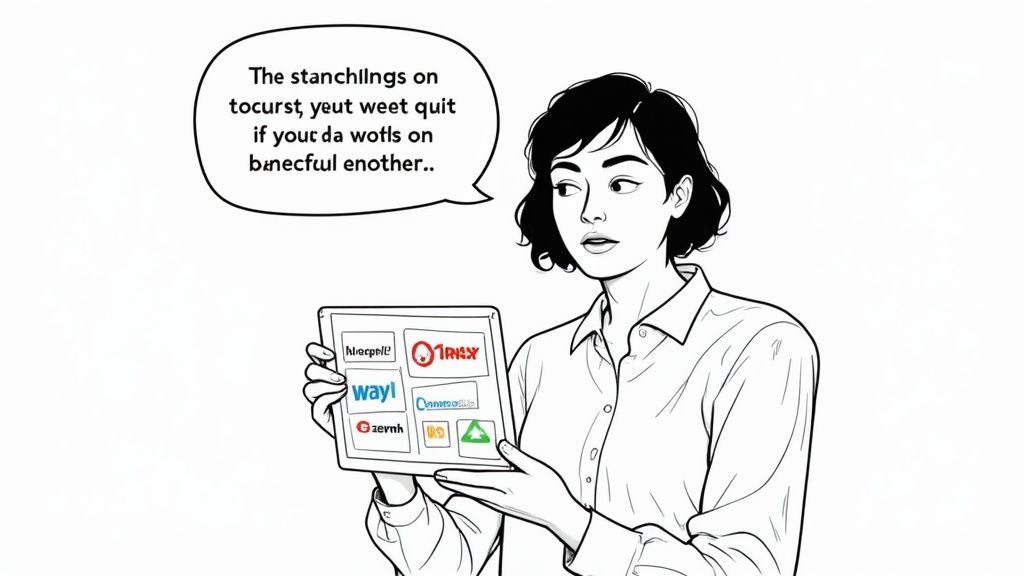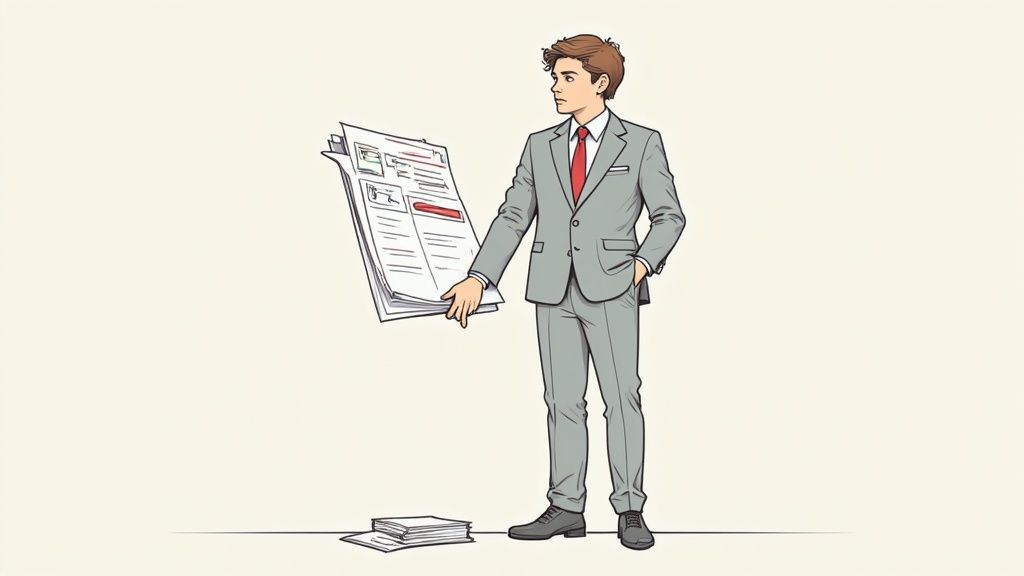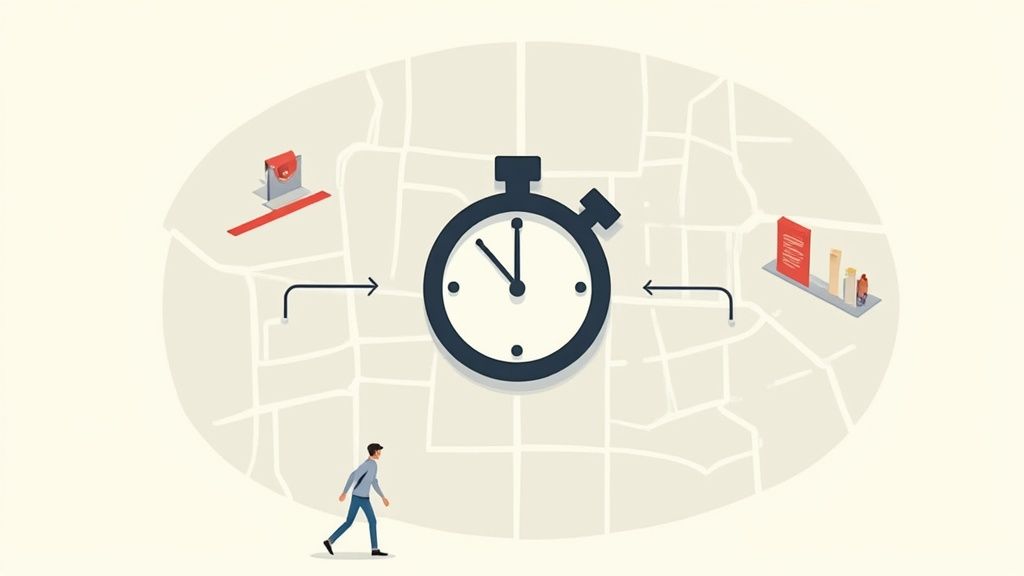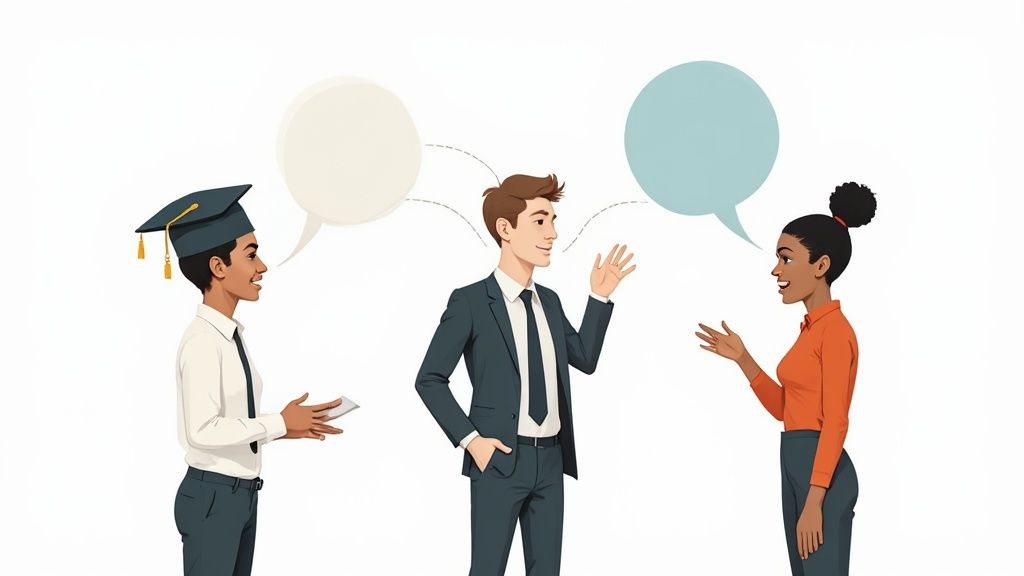
Top College Career Fair Tips to Land Your Dream Job
College career fairs can feel overwhelming: a maze of booths, a sea of suits, and the constant pressure to make a lasting impression in just a few minutes. Many students arrive with a resume and a hopeful smile, only to leave feeling lost in the crowd. But with the right strategy, these events transform from chaotic hurdles into powerful springboards for your career. This is not a guide filled with vague suggestions; it is a definitive playbook designed to give you a clear competitive advantage.
This article provides actionable college career fair tips that cover every stage of the process. We will break down the entire experience into three manageable phases: meticulous preparation before you arrive, strategic execution on the day of the event, and impactful follow-up that ensures you are not forgotten. Each of the eight tips is crafted to help you navigate the fair with purpose, make genuine connections with key people, and turn brief conversations into tangible opportunities. Forget just surviving the fair; this guide will teach you how to master it. Let’s get started on your path from student to sought-after professional.
1. Research Companies and Practice Your Elevator Pitch
Walking into a career fair without a plan is like navigating a new city without a map. The most effective attendees arrive with a clear strategy, and that strategy begins with targeted research and a polished introduction. This preparation is a cornerstone of our college career fair tips because it transforms a potentially overwhelming event into a series of meaningful, productive conversations. By knowing which companies you want to meet and what you want to say, you immediately stand out from the crowd of unprepared students.

This approach signals genuine interest and professionalism. Recruiters are far more impressed by a candidate who can speak specifically about their company’s recent projects or values than one who simply asks, “So, what do you do?” The data backs this up: a University of Michigan study found that students using researched talking points saw a 40% increase in callback rates.
How to Implement This Strategy
Effective preparation involves two key components: deep research and a concise, compelling elevator pitch.
- Company Research: Most career fairs provide a list of attending employers in advance. Select 5-10 “must-visit” companies and dive into their digital footprint. Look for their mission statement, recent press releases, and key projects. Identify specific roles they have open that align with your skills and aspirations.
- Pitch Development: Your elevator pitch is a 30-60 second verbal business card. It should quickly summarize who you are, what you offer, and why you are interested in their company specifically. It’s a critical tool for making a strong first impression and guiding the conversation.
Actionable Tips for Success
- Tailor Your Pitch: Don’t use a generic script. For each target company, slightly adjust your pitch to connect your experience to their specific needs or values. For example, mention a recent company initiative you admire.
- Prepare Smart Questions: Develop 2-3 insightful questions for each target employer based on your research. Ask about team culture, challenges in a specific role, or professional development opportunities.
- Practice, Don’t Memorize: Rehearse your pitch with friends, family, or your university’s career services. The goal is to sound confident and conversational, not robotic.
- Quantify Your Achievements: Instead of saying you “worked on a project,” say you “led a team project that improved efficiency by 15%.” Concrete numbers make your experience more tangible and impressive.
2. Dress Professionally and Bring Quality Materials
Your appearance and the materials you carry are the first non-verbal signals you send to a recruiter, and they form an impression long before you even speak. Presenting yourself professionally with well-organized, high-quality materials shows you are serious, prepared, and respect the opportunity. This is a fundamental component of our college career fair tips because it immediately conveys competence and attention to detail, two qualities universally valued by employers.

This visual first impression can significantly influence a recruiter’s perception. For instance, representatives at major firms like JPMorgan Chase note that professional dress heavily impacts initial screening decisions. Likewise, Deloitte recruiters report that students who present organized materials are 60% more likely to receive a follow-up interview. Your polished resume and professional attire work together to create a powerful, positive statement.
How to Implement This Strategy
Effective presentation requires a dual focus: your personal attire and your professional documents. Both should be meticulously prepared before the event.
- Professional Attire: The standard is typically business professional or business casual. For men, this often means a suit or slacks with a blazer and tie. For women, a suit, dress pants or skirt with a blouse, or a professional dress is appropriate. The key is to look polished and clean.
- Quality Materials: Your resume is your primary marketing document. It must be updated, tailored, and completely free of errors. Bringing multiple copies in a professional padfolio or portfolio keeps them crisp and organized, preventing you from fumbling through a backpack.
Actionable Tips for Success
- Bring More Resumes Than You Need: Plan to bring at least 15-20 copies of your resume on quality paper. It’s better to have extras than to run out when you meet a promising employer unexpectedly.
- Use a Professional Padfolio: A padfolio not only keeps your resumes, business cards, and a pen organized but also provides a firm surface for taking notes during conversations.
- Proofread Meticulously: A single typo can undermine your credibility. Have your resume reviewed by career services, a professor, or a trusted peer. For additional support, consider using an AI resume builder for free to help catch errors and optimize content.
- Choose Comfortable Professional Shoes: You will be standing and walking for hours. Ensure your professional footwear is comfortable enough to wear for an extended period without causing discomfort.
3. Arrive Early and Plan Your Route Strategically
The difference between a frantic, unproductive career fair experience and a calm, successful one often comes down to timing and navigation. Arriving early with a pre-planned route is one of the most impactful college career fair tips because it gives you a crucial competitive advantage. You get to engage with recruiters when they are fresh, attentive, and not yet overwhelmed by crowds, maximizing the quality of your interactions.

This strategic approach prevents you from wasting valuable energy standing in long lines for your top-choice employers. Evidence strongly supports this tactic: Amazon’s campus recruiting team reports that approximately 70% of their follow-up interviews are with students they met in the first half of a career fair. Similarly, a study at Georgia Tech revealed that students who arrived within the first 30 minutes were twice as likely to secure on-campus interviews.
How to Implement This Strategy
Success with this method hinges on pre-event planning and disciplined execution on the day of the fair.
- Obtain the Floor Plan: Before the event, your university’s career services will typically release a list of attending companies along with a map of the venue. Download this map and identify the precise locations of your top-tier target companies.
- Create a Prioritized Itinerary: Don’t wander aimlessly. Based on the map, create a physical route that takes you to your 5-8 “must-visit” employers first. Group them by location to minimize walking time and maximize efficiency.
Actionable Tips for Success
- Get There Before the Doors Open: Aim to arrive at the venue at least 15-20 minutes before the official start time. This ensures you are one of the first students through the door and can head directly to your number one target.
- Allocate Your Time Wisely: Plan to spend no more than 15-20 minutes at each high-priority booth. This allows you to have a meaningful conversation without falling behind schedule.
- Visit Priority Companies First: Your energy and focus are highest at the beginning of the event. Use this peak performance window to engage with the companies that matter most to your career goals.
- Schedule Breaks: Plan short breaks to step away from the noise, review your notes, and recharge. This helps you stay sharp for later conversations with second-tier companies.
4. Ask Thoughtful Questions and Show Genuine Interest
After delivering your elevator pitch, the conversation shifts, and the questions you ask become your most powerful tool. Engaging recruiters with insightful, researched questions demonstrates genuine curiosity and professionalism, moving the interaction beyond a simple resume drop. This is one of the most critical college career fair tips because it shows you’ve done your homework and are truly evaluating if the company is a good fit for you, not just the other way around.

Quality questions lead to more substantive conversations and help you stand out from the sea of students asking generic questions. For instance, PwC representatives report that students asking about mentorship programs are 50% more likely to receive interview invitations. Similarly, IBM’s campus team notes that questions about career progression paths signal a serious, long-term candidate. Asking the right questions transforms you from a passive applicant into an active, engaged professional.
How to Implement This Strategy
The goal is to prepare questions that cannot be easily answered by a quick search on the company’s website. Your questions should open the door to a real conversation about experiences, culture, and future opportunities.
- Research-Based Inquiries: Link your questions to specific information you found during your research. Mentioning a recent project, a new company initiative, or a value stated on their careers page shows you’ve invested time and effort.
- Experience-Oriented Questions: Ask the recruiter about their personal experience. People often enjoy sharing their own stories, and their answers can provide invaluable, unscripted insights into the company culture and day-to-day work life.
Actionable Tips for Success
- Prepare 4-5 Questions Per Company: Have a list of thoughtful questions ready for each of your target employers. This ensures you are prepared and won’t draw a blank.
- Focus on Growth and Culture: Inquire about typical career progression, mentorship programs, or professional development opportunities. Ask, “What does success look like for someone in this role in the first year?”
- Ask About Their Experience: A great question is, “What has been the most challenging or rewarding project you’ve worked on here?” or “What do you enjoy most about working at this company?”
- Avoid Obvious Questions: Do not ask, “What does your company do?” or questions about salary and benefits during this initial interaction. Save those for later stages of the interview process.
5. Network Beyond Just Recruiters
While recruiters are the primary point of contact at company booths, they are rarely the only representatives present. A common oversight in many college career fair tips is focusing solely on HR personnel. The most strategic networkers understand that booths are often staffed by recent alumni, hiring managers, and current employees from various departments, each offering a unique and valuable perspective. Engaging with these individuals can unlock insights and opportunities that a formal conversation with a recruiter might miss.
This broader approach to networking provides a more holistic view of a company’s culture and the reality of a specific role. A recent graduate can offer unfiltered advice about the transition from college to the workplace, while a department manager can speak directly to the technical challenges and growth paths on their team. For example, a Northwestern student secured a coveted Goldman Sachs internship not through the recruiter, but by connecting with an alumnus at the booth who championed their application internally.
How to Implement This Strategy
Expanding your networking targets requires a shift in mindset from simply “pitching” to “connecting” and gathering information from multiple sources.
- Identify Different Roles: When you approach a booth, take a moment to observe the name tags. Look for titles like “Software Engineer,” “Marketing Associate,” or “Alumni Representative” in addition to “Talent Acquisition” or “Recruiter.”
- Engage with a Purpose: Tailor your questions to the person’s role. Ask a recent grad about their first-year experience, a hiring manager about the key skills they look for, and a recruiter about the overall hiring timeline. This demonstrates attentiveness and makes the conversation more relevant for everyone.
Actionable Tips for Success
- Prioritize Alumni Connections: If your university’s alumni are present, make them a priority. Start the conversation by mentioning your shared connection, which can quickly build rapport and lead to a more personal discussion.
- Ask About Day-to-Day Realities: Ask current employees questions like, “What does a typical day in this role look like?” or “What’s the most challenging project you’ve worked on?” This provides a ground-level view that complements the recruiter’s high-level overview.
- Connect on LinkedIn Promptly: Follow up within 48 hours by sending a personalized LinkedIn connection request to everyone you spoke with. You can learn more about how to optimize your LinkedIn profile to make a lasting impression.
- Don’t Forget Your Peers: Network with other students in line. They may have insights about other companies or roles you hadn’t considered, and building a professional peer network is valuable in itself.
6. Follow Up Promptly and Professionally
The conversations you have at the career fair are just the beginning; the real work often starts after you leave. Effective follow-up is the bridge between a memorable conversation and a tangible job opportunity. This step is a critical component of our college career fair tips because it reinforces your interest, demonstrates professionalism, and keeps you top-of-mind as recruiters sift through hundreds of potential candidates. A prompt, personalized message can be the deciding factor that moves your resume from the “maybe” pile to the “interview” list.
Neglecting this step essentially negates all the hard work you put into preparing for and attending the fair. Recruiters from firms like Ernst & Young report that students who send a follow-up message within 24 hours are three times more likely to secure an interview. This simple action signals that you are organized, proactive, and genuinely enthusiastic about the role.
How to Implement This Strategy
A successful follow-up strategy is built on timeliness and personalization. It involves sending thank-you emails, connecting on professional networks, and completing any requested next steps without delay.
- Personalized Thank-You Email: Within 24-48 hours, send a concise, professional email to each recruiter you had a significant conversation with. This message should thank them for their time and briefly reiterate your interest.
- LinkedIn Connection: Send a personalized connection request on LinkedIn. Mentioning where you met (“It was great speaking with you at the [University Name] Career Fair”) significantly increases the chance of acceptance, with LinkedIn data showing personalized requests have 70% higher acceptance rates.
Actionable Tips for Success
- Take Notes: During or immediately after each conversation, jot down the recruiter’s name, contact info, and a key detail you discussed. This will be invaluable for personalizing your follow-up.
- Reference Specifics: In your email, mention a specific topic you discussed, such as a company project or a piece of advice they gave you. This proves you were actively listening.
- Attach Your Resume: Include a digital copy of your resume in your follow-up email, even if you already handed them a physical one. This makes it easy for them to forward your information to the hiring manager.
- Keep it Concise: Your email should be professional and to the point. Aim for three short paragraphs: a thank you, a brief reminder of your conversation and qualifications, and a call to action. You can learn more about crafting the perfect message by reviewing examples of an application follow-up email.
7. Practice Active Listening and Take Notes
A career fair conversation is a two-way street, not a monologue. Many students focus so much on their pitch that they forget to genuinely listen, a mistake that can undermine their efforts. Active listening demonstrates engagement, respect, and intellectual curiosity. It’s one of the most underrated college career fair tips because it helps you gather valuable information for personalized follow-ups and informed decision-making, setting the stage for a successful interview.
This practice is more than just being polite; it’s a strategic advantage. For example, consulting firms and client-facing roles place a high premium on candidates who demonstrate strong listening skills during initial interactions. Studies from MIT have also shown that students who took brief notes during conversations had a 40% better recall of specific opportunities discussed, which is crucial when you’ve spoken to a dozen recruiters in one afternoon.
How to Implement This Strategy
Combining active listening with discreet note-taking creates a powerful feedback loop, allowing you to tailor your conversation in real-time and retain critical details for later.
- Engage with Active Listening: Focus completely on what the recruiter is saying. Paraphrase their points to confirm understanding (“So, it sounds like the biggest challenge in this role is…”) and ask relevant follow-up questions based directly on their response. This shows you are processing the information, not just waiting for your turn to speak.
- Take Strategic Notes: Your goal is not to transcribe the conversation but to capture key takeaways. Jot down the recruiter’s name, their contact information if offered, specific project names, key skills they mention, and any next steps they recommend. This information is invaluable for a memorable follow-up.
Actionable Tips for Success
- Use a Professional Portfolio: Carry a leather or professional-looking portfolio with a small notepad inside. This makes note-taking look organized and intentional rather than frantic or distracted.
- Find Natural Pauses: Don’t write while the recruiter is speaking. Use natural pauses in the conversation, like when you are asking a question, to quickly jot down a keyword or name.
- Step Away to Elaborate: Immediately after leaving the booth, find a quiet spot to expand on your brief notes while the details are still fresh in your mind.
- Note Personal Connections: If you and the recruiter discovered a shared interest or alma mater, make a note of it. Referencing this in your follow-up email can make your message stand out.
8. Maintain Energy and Authenticity Throughout the Event
A career fair is a marathon, not a sprint. The hours of standing, talking, and actively selling your skills can be physically and emotionally draining. This is why maintaining high energy levels and authentic enthusiasm is one of the most underrated college career fair tips. Recruiters, who speak to hundreds of students, can easily spot fatigue and disinterest. Your ability to remain genuinely engaged, even in the final hour, can make you significantly more memorable than the students just going through the motions.
Think of it from the recruiter’s perspective: they are also tired. A student who approaches their booth late in the day with a fresh smile and genuine curiosity provides a welcome burst of energy. Research from Stanford’s career services found that students who consciously managed their energy and maintained enthusiasm throughout four-hour fairs received 60% more follow-up contacts. An authentic personality often leaves a more lasting impression than a flawless but robotic pitch.
How to Implement This Strategy
Sustaining your energy and authenticity requires a deliberate game plan focused on both physical and mental well-being throughout the event.
- Physical Preparation: Your body is your engine for the day. Fuel it properly before you start and plan for maintenance. This means eating a balanced, substantial meal beforehand, staying hydrated, and having a small, healthy snack on hand.
- Mental Pacing: Approaching the fair with a mindset of quality over quantity is key. Instead of trying to talk to every single employer, focus on having a smaller number of high-quality, genuine conversations. This prevents burnout and makes each interaction more meaningful.
Actionable Tips for Success
- Plan Strategic Breaks: Don’t wait until you’re completely drained. Schedule a short, 5-10 minute break every 60-90 minutes to step away, sit down, have some water, and mentally reset.
- Stay Hydrated and Snack Smart: Bring a water bottle and a non-messy snack like a protein bar or nuts. Limit caffeine, which can lead to a crash, and stick to water to stay mentally sharp.
- Focus on Connection, Not Perfection: Shift your goal from delivering a perfect pitch to making a genuine human connection. Ask the recruiter about their day or their own career path to foster a more natural, two-way conversation.
- Use Positive Self-Talk: Between conversations, take a deep breath and give yourself a quick mental pep talk. Remind yourself of your goals and your value to combat any feelings of fatigue or discouragement.
8 Key College Career Fair Tips Comparison
| Strategy | Implementation Complexity 🔄 | Resource Requirements ⚡ | Expected Outcomes 📊 | Ideal Use Cases 💡 | Key Advantages ⭐ |
|---|---|---|---|---|---|
| Research Companies and Practice Your Pitch | Medium (2-3 hours per company) | Moderate (time for research and practice) | Increased callback rates; meaningful recruiter conversations | Engaging recruiters with tailored messaging | Creates memorable first impressions; shows initiative |
| Dress Professionally and Bring Quality Materials | Low to Medium (preparation & investment) | High (professional attire, printed resumes) | Positive first impression; higher follow-up interviews | Career fairs requiring face-to-face interaction | Demonstrates professionalism and organization |
| Arrive Early and Plan Your Route Strategically | Low (planning and timing) | Low (time management tools/planning) | Priority access; more meaningful conversations | Large fairs with multiple target companies | Shorter waits; more energetic recruiter engagement |
| Ask Thoughtful Questions and Show Genuine Interest | Medium to High (significant prep time) | Moderate (research and question prep) | Memorable interactions; insider information gained | Deep company insight and fit assessment | Demonstrates preparation; helps evaluate fit |
| Network Beyond Just Recruiters | Medium (extra conversations and follow-up) | Moderate (time for networking and follow-up) | Diverse perspectives; leads from alumni and peers | Expanding professional network beyond recruiters | Builds long-term connections; multiple pathways |
| Follow Up Promptly and Professionally | Medium (personalized communication) | Low to Moderate (time to write and send) | Higher interview chances; keeps candidate top-of-mind | After-career fair engagement | Demonstrates professionalism; reinforces interest |
| Practice Active Listening and Take Notes | Medium (multitasking skill required) | Low (notepad/pen) | Better information retention; stronger follow-ups | Managing multiple conversations | Shows engagement; aids detailed recall |
| Maintain Energy and Authenticity Throughout the Event | Medium (physical/emotional effort) | Moderate (planning breaks, nutrition) | Positive lasting impressions; rapport building | Long, intensive career fairs | Demonstrates genuine interest; professionalism under pressure |
Beyond the Booth: Turning Connections into Your Career
Successfully navigating a college career fair is an art form, one that transforms a crowded, often overwhelming event into a launchpad for your professional journey. It’s about moving beyond the surface-level exchange of résumés for free swag and engaging in strategic, memorable interactions. The eight core pillars we’ve explored, from meticulous pre-fair research to authentic, energetic engagement, are not just isolated tasks; they are interconnected components of a comprehensive strategy.
Remember, your preparation in researching companies and crafting your elevator pitch is what allows you to ask thoughtful questions and show genuine interest. Arriving early with a strategic route plan maximizes your time, enabling you to maintain your energy and authenticity from the first handshake to the last. Every element, including your professional attire and the quality of your materials, sends a powerful message about your seriousness and commitment.
From Handshake to Hire: The Power of Proactive Follow-Through
The true measure of your success at a career fair isn’t the number of business cards you collect, but the number of meaningful connections you cultivate. This is where many students falter. They treat the end of the fair as the finish line, when it is truly the starting gun for the next phase of the hiring process. The most critical of all college career fair tips is to understand that the event itself is just one touchpoint.
The real work begins with your follow-up. A prompt, personalized email referencing a specific detail from your conversation can elevate you from a forgotten face in the crowd to a priority candidate. It demonstrates initiative, reinforces your interest, and proves you were actively listening. This single action bridges the gap between a brief encounter and a formal interview process.
Key Takeaway: A career fair is not a one-day event. It’s the beginning of a conversation. Your post-fair actions, especially your follow-up, are what determine whether that conversation continues.
Actionable Next Steps: Mobilize Your Momentum
Now is the time to consolidate your efforts and turn potential into progress. Do not let the momentum you’ve built fade away. Take these immediate, concrete steps to capitalize on the connections you’ve made:
- Organize Your Contacts: Within 24 hours, organize the business cards and notes you collected. Create a simple spreadsheet to track names, companies, roles, and key conversation points.
- Send Personalized Follow-Up Emails: Draft and send tailored thank-you emails to every recruiter and professional you spoke with. Reference your notes to make each message specific and memorable.
- Connect on LinkedIn: Send personalized connection requests on LinkedIn, briefly reminding them of where you met and a topic you discussed.
- Tailor and Apply: For the roles that genuinely excite you, immediately begin tailoring your résumé and cover letter. Use insights gained from your conversations to align your application directly with the company’s needs and culture.
Mastering these post-fair actions is what separates the successful job seeker from the rest. It shows a level of professionalism and dedication that recruiters notice and value. You’ve done the hard work of preparing and performing; now, complete the cycle with diligent follow-through to secure the interviews you’ve earned. Your future career is built one connection at a time, so make every single one count.
Ready to turn those career fair connections into compelling applications? Streamline your follow-up process with Jobcamp, the AI-powered platform designed to help you create customized résumés and cover letters in minutes. Stop spending hours tailoring documents and start landing more interviews by visiting Jobcamp to build applications that truly stand out.

